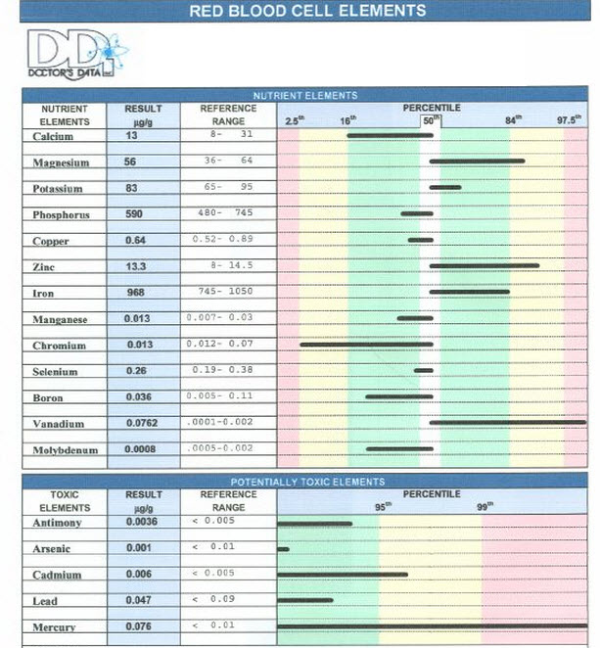
Depression: Functional Medicine Approach
By Ronald Grisanti, DC, DABCO, DACBN, MS
Depression is considered the most dreaded condition of mankind. What makes depression...
The Best Test for Mineral Deficiencies
Ronald Grisanti D.C., D.A.B.C.O., D.A.C.B.N., M.S.
The RBC Erthrocyte Blood Test can determine if you have mineral imbalances or toxic metal poisoning.

Essential minerals are necessary for life, assisting in the production of energy and other important biochemical processes.
Mineral insufficiencies, excesses, or imbalances can lead to illness.
Toxic elements, such as mercury or cadmium, may accumulate in the body due to chronic exposure and may lead to illness at very small amounts.
Some elements, such as lead, mercury, and cadmium, become toxic when too many sneak into the body.
This can lead to chronic symptoms, both physical and mental. These minerals are required for the body's structural tissues and for metabolic functions, particularly enzyme reactions. However, deficiencies or imbalances among elements can lead to problems.
For Example:
Low zinc is associated with poor wound healing, weight problems, depressed libido, hair loss, and impotence.
Low magnesium is associated with cardiovascular problems, depression, and anxiety.
Low copper is associated with joint pain, elevated cholesterol, anemia, and reduced resistance to infection.
Low manganese is associated with back and joint problems, hypoglycemia, and allergies.
Such imbalances can result from toxins, an improper diet, genetic predisposition, maldigestion or malabsorption of food, some medications, excess stress or an improper balance of nutritional supplements.
Mineral imbalances are linked to: fatigue, headaches, osteoporosis, malnutrition, depression, hypoglycemia, cancer, aggressive behavior, allergies, joint pain, diabetes, digestive disorders, learning disabilities, attention deficit disorder, autism, and hypothyroidism.
Toxic Metals
Toxic metal accumulation is likely in an environment plagued by pollutants.
Toxic metals, normally are present in the body in small amounts. However, they accumulate with excessive or continual exposure or if your body's detoxifying defenses aren't up to par.
These same metals may inhibit enzymes in your body, weaken cell membranes, or impair nutrient delivery, which can lead to illness.
Exposure most commonly occurs through everyday living but may result from an industrial work environment.
Examples include exposure to cigarette smoke (cadmium), hydrogenated oils (nickel), antiperspirants and antacids (aluminum), some toothpastes and cans (tin), tap water (lead), and tooth fillings and fish (mercury).
Excess lead is associated with fatigue, constipation, insomnia, emotional disturbances, hyperactivity, and learning disabilities in children.
Excess aluminum is associated with Alzheimer's disease and may also lead to the depletion of phosphorus in the body, which is critical for bone heath.
Excess arsenic is associated with fatigue, skin problems, and tingling in the extremities.
Excess cadmium is associated with fatigue, tissue aging, musculoskeletal pain, anemia, and hypertension. RBC erthrocyte is considered the best evaluation of long term mineral status.
Compliments from Functional Medicine University

Depression: Functional Medicine Approach
By Ronald Grisanti, DC, DABCO, DACBN, MS
Depression is considered the most dreaded condition of mankind. What makes depression...
